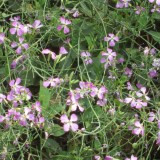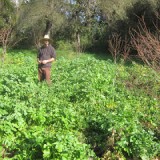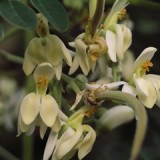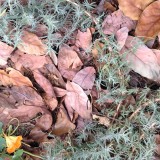
First published in Japanese in the mid 1990s, Masanobu Fukuoka’s book Sowing Seeds in the Desert: Natural Farming, Global Resotration, and Ultimate Food Security is now in English in a beautiful translation published by Chelsea Green.
Fukuoka’s writing deals with the tricky practical and spiritual issues involved with our place in nature’s synergistic complexities. To intervene or not to intervene is often the question when it comes to what Fukuoka called his “natural farming” method.
Fukuoka councils a humbleness before nature, a cessation of the materialist drive to understand and control. Fukuoka illustrates this approach in a pen and ink drawing reproduced in the book. Of the drawing he says,
I call it “the cave of the intellect.” It shows two men toiling in a pit or a cave swinging their pickaxes to loosen the hard earth. The picks represent the human intellect. The more these workers swing their tools, the deeper the pit gets and the more difficult it is for them to escape. Outside the cave I draw a person who is relaxing in the sunlight. While still working to provide everyday necessities through natural farming, that person is free from the drudgery of trying to understand nature, and is simply enjoying life.
Paradoxically his natural farming method involves, on the one hand, letting vegetables reseed on their own and revert to their wild ancestry, while on the other avoiding the neglect that led to the loss of hundreds of trees at his parent’s farm when he first took it over. And in the second half of the book he suggests a radical interventionist approach to what he calls “deserts” (by which he means areas ruined by human activity). Here he chronicles his trips to wastelands in India and the Central Valley of California. Fukuoka suggests carpet bombing these areas with seed pellets (a how-to for making seed pellets is included in an appendix). And the content of those seed balls? Whatever will re-vegetate the landscape most effectively regardless of whether those plants are native or not in order to achieve what Fukuoka calls a “second Genesis.” As he puts it,
I would mix the seeds of all plants–forest trees, fruit trees, perennials, vegetables, grasses and legumes–as well as ferns, osses, and lichens, and sow them all at once across the desert.
Nativists will cringe at this suggestion but to me it makes a lot of sense. Fukuoka says that these desertified areas lack the seeds needed to recover on their own.
Sowing Seeds in the Desert is a book steeped in a passionate Buddhism. The real desert is in the human heart. It’s our hearts that Fukuoka is trying to heal and by so doing, bring about that second Genesis.
When people try to grow crops using human knowledge, they will never be anything more than farmers. If they can look at things with an empty mind as a child does, then, through the crops and their own labor, they will be able to gaze into the entire universe.
Those unfamiliar with Fukuoka’s philosophy should start by reading The One Straw Revolution. And if you want to get the nitty-gritty how-to on how to apply his natural farming methods you’ll want to pick up a copy of The Natural Way of Farming. Sowing Seeds in the Desert serves as a deeply moving coda to his life’s work. And it got me to start sowing the seeds in my own front yard desert. Thanks to a winter rain, a mixture of clover and greens is now sprouting beneath the fig tree that graces our front yard.
Thanks to the wonders of Youtube, you can watch an hour long documentary about Fukuoka here.





You have convinced me. I have to have this book. I loved One Straw Revolution. Thank you!I’m still eating radish leaves from radishes I let go to seed four years ago. They keep coming back! I love the little spicy broccoli like heads they get before they flower.
I too love Masanobu’s writings. I bought his One Straw Revolution while studying in India.
Thanks for the heads up about the new book!
I’m not a natural farmer, by any stretch, but he has definitely influenced my growing techniques. I’m natural-lite maybe, I have to keep the neighbors happy. 😀
Thank you for this insightful review. People can never understand nature. It is not about understanding and control, as you rightly said, but about joy and gratitude.
Hi Larry–meant to say what a great translation you did. No easy task to translate complex ideas in Japanese into English.